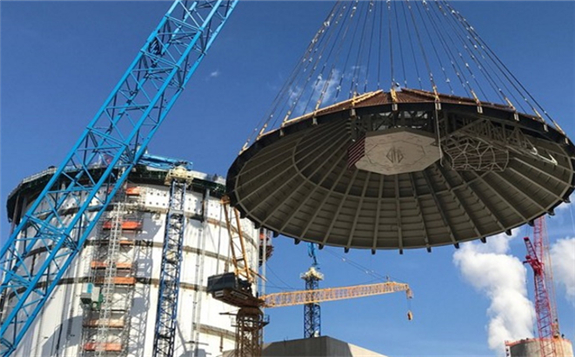Georgia Power has lifted the shield building roof of Vogtle unit 4 into place, meaning there is now one last major crane lift remaining for the project to build two AP1000 units at the Waynesboro site. It has also completed the pre-operational condenser vacuum test of Vogtle unit 3's turbine system.

The 907-tonne shield building roof measures 41 metres in diameter and is 11.3 metres tall. Its placement follows the setting of the unit's containment vessel top, which took place in March. The shield building provides an additional layer of safety around the containment vessel and nuclear reactor to protect the structure from any potential impacts, and is a feature of the AP1000 reactor design for the Vogtle units, Georgia Power said.
The last major crane lift at the Vogtle construction site will be unit 4's CB-20 module, which is part of the AP1000 reactor's advanced passive safety system.
The pre-operational condenser vacuum test at Vogtle unit 3 showed that the steam supply and water-cooling systems can operate together and are ready to support hot functional testing and initial fuel load in the reactor. The test required multiple systems, including circulating water, condensate, auxiliary steam and condenser air removal, to be operated in an integrated manner after having been successfully tested individually. Before the test could be performed, the turbine was previously tested and rotated on its turning gear. The main turbine system consists of one high-pressure turbine and three low-pressure turbines.
Georgia Power last week took delivery of the first shipment of nuclear fuel for Vogtle unit 3 and is now preparing for hot functional testing of the unit which is the last major test ahead of fuel loading.
Construction of Vogtle unit 3 began in March 2013 and unit 4 in November the same year. Unit 3 is expected to be in service by November 2021 and unit 4 by November 2022.